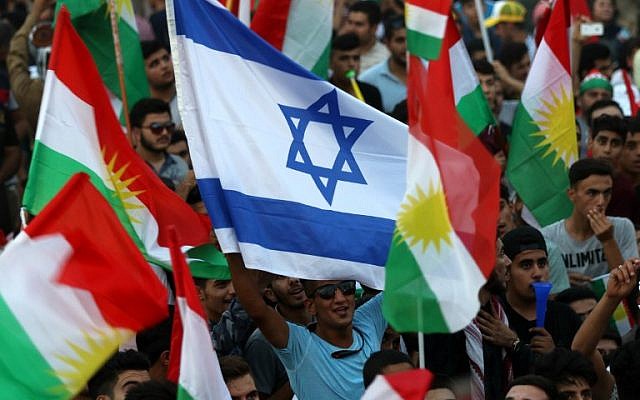Hosting Turkish president, Iranian leader claims Washington, Jerusalem benefit from vote

Iraqi Kurds fly an Israeli flag and Kurdish flags during an event to urge people to vote in the upcoming independence referendum in Arbil, the capital of the autonomous Kurdish region of northern Iraq, on September 16, 2017. (AFP/Safin Hamed)
Iran’s Supreme Leader, Ayatollah Ali Khamenei, said on Wednesday that the United States and Israel were some of the only countries benefiting from the recent referendum in Iraq’s Kurdistan region and that Washington and other Western powers were seeking to “create a new Israel” in the Middle East.
Khamenei made the remarks in a meeting with Turkish President Recep Tayyip Erdogan who was in Iran on a state visit.
“America and Israel benefit from the vote… The United States and foreign powers are untrustworthy and seek to create a new Israel in the region,” Khamenei told Erdogan, according to the state-run Press TV network.
“Iran and Turkey should take every possible measure against the move and the Iraqi government, too, should make decisions and take serious action,” Khamenei added.
The Iraqi Kurdish secession vote is an act of betrayal toward the entire region,” he went on.
The nonbinding referendum — in which the Kurds voted more than 90 percent in favor of a break with Iraq — will not immediately result in independence. But Kurdish leaders have said they will use it to press for negotiations on eventually forming their own state.
Earlier this week, Erdogan claimed that the Israeli Mossad had a hand in the Kurdish referendum, a claim Israel has rejected.
Israel has been among the only countries to openly support an independent Kurdish state, and many Kurds have openly welcomed Israel’s support, drawing accusations from Arab leaders that last week’s referendum was a Zionist plot. The US, meanwhile, had opposed the vote, calling it provocative and destabilizing.
In a televised broadcast Saturday Erdogan claimed that Turkey had been saddened to see some Iraqi Kurds celebrating the independence referendum with Israeli flags.
“This shows one thing, that this administration (in northern Iraq) has a history with Mossad, they are hand-in-hand together,” Erdogan said in Erzurum, in eastern Turkey.
A day later, Prime Minister Benjamin rejected the claims and took a shot at Erdogan for blaming Mossad meddling for every tricky situation Turkey faces.
Iran and Turkey fear the secession of Iraq’s Kurds would stoke separatist sentiment among their own large Kurdish minorities and are eager to work together with the federal government in Baghdad to block it.
Both Iran and Turkey have held military manoeuvres close to their borders with Iraqi Kurdistan to ratchet up the pressure on Kurdish leaders.
Those exercises have also involved forces of the federal government in Baghdad, which has demanded the annulment of the vote which returned a 92.7 percent “yes” for independence.
Baghdad imposed a ban on all international flights to Kurdish airports on Friday prompting an exodus of foreigners.
Iran has ordered a halt to all trade in fuel products with Iraqi Kurdistan and has said it will allow Iraqi federal forces to deploy at its border crossings with the region.
Turkey has threatened to close its land border and halt the export of oil from Iraqi Kurdistan to the Turkish port of Ceyhan, an economic lifeline.
Since 1984, Turkey has battled rebels of the outlawed Kurdistan Workers’ Party (PKK) which has rear bases in northern Iraq and which initially sought to create a breakaway state.
Earlier Wednesday, Erdogan met with Iranian President Hassan Rouhani.
“Some leaders of Iraq’s Kurdistan region have made erroneous decisions which must be corrected,” Iran’s President Hassan Rouhani said after talks with Erdogan, visiting Tehran for the first time since 2015.
“Iran, Turkey and Iraq are obliged to take serious and necessary measures,” he said in reference to retaliatory measures adopted since Iraqi Kurdistan’s disputed September 25 independence referendum.
Erdogan, in a translation on Iranian state television of his comments, warned of “stronger” measures to follow and said the autonomous Kurdish region in northern Iraq would remain “isolated”.



Leave a Reply
You must be logged in to post a comment.